The Knickerbockers ‘Lies’: Sounding Like the Beatles Was Enough
by Jeff Tamarkin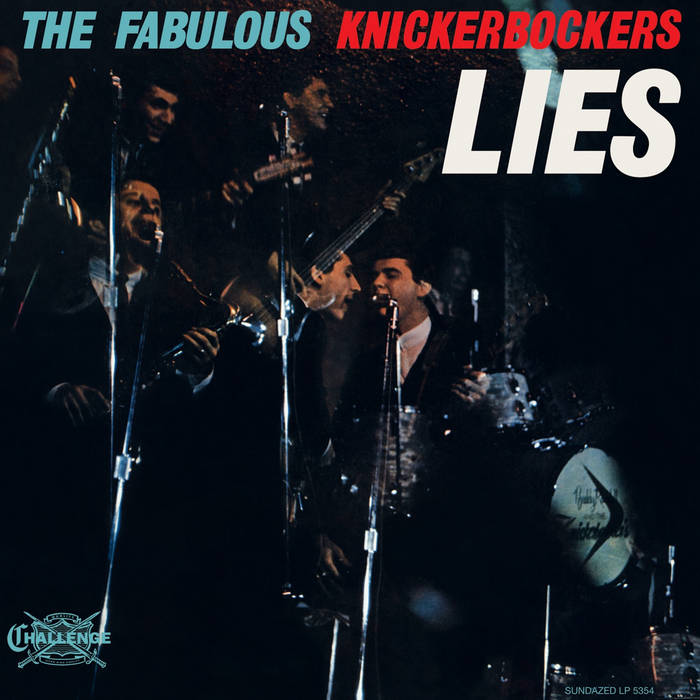 By late 1965, nearly two years after the Beatles first broke in America, there were hundreds—probably even thousands—of small rock combos in the United States that considered the Fab Four, and other leading English bands like the Rolling Stones, the Kinks and the Yardbirds, their North Star. Some of these Stateside bands had been kicking around before the British Invasion and smartly started combing their hair over their foreheads and copping George Harrison licks, but many others had formed in the wake of hearing and seeing the Beatles—and envying their impact.
By late 1965, nearly two years after the Beatles first broke in America, there were hundreds—probably even thousands—of small rock combos in the United States that considered the Fab Four, and other leading English bands like the Rolling Stones, the Kinks and the Yardbirds, their North Star. Some of these Stateside bands had been kicking around before the British Invasion and smartly started combing their hair over their foreheads and copping George Harrison licks, but many others had formed in the wake of hearing and seeing the Beatles—and envying their impact.
One was the Knickerbockers, a quartet from Bergenfield, New Jersey, that had formed around the brothers Beau and John Charles (guitar and bass, respectively, with both singing). The Charleses (original names Robert and John Carlos Cecchino), along with Buddy Randell (saxophone and vocals; original name William Crandall) and drummer Jimmy Walker, took their band moniker from Knickerbocker Road in nearby Tenafly, N.J.—they thought it sounded British. After building up a bit of a local reputation, they were discovered during a gig in Albany, N.Y., by producer and singer-songwriter Jerry Fuller (he’d written the hit “Travelin’ Man” for Ricky Nelson), who brought them to the attention of Challenge Records in Los Angeles.
The label had been founded several years earlier by cowboy singer Gene Autry and had enjoyed a number of chart successes, notably the semi-instrumental “Tequila” by the Champs, a group that had once featured Fuller himself as a vocalist. But Challenge wasn’t having much luck maintaining its status as the rock music scene shifted its focus toward the British bands, and was hoping that the Knickerbockers might be the ticket—if only they could find the right song.
At first, they couldn’t: Neither 1964’s “All I Need is You”/“Bite Bite Barracuda” nor the following year’s “Jerktown”/“Room for One More” managed to scrape into the charts. But that drought came to a quick end in November 1965 with the release of “Lies,” a melodic, uptempo song so reminiscent of the Beatles that many listeners hearing it on their local Top 40 radio station thought at first that it might actually be the Brits, recording under an assumed name. With its crisp vocal harmonies, driving beat and soaring guitars, “Lies”—written by Beau Charles and Randell, and produced by Fuller—had all of the earmarks of a new Beatles side, except, of course, that it wasn’t the work of John, Paul, George and Ringo but rather that of John, Beau, Buddy and Jimmy.
Lyrically, “Lies” was nothing out of the ordinary. “You’re telling me that you’ll be true,” the boys sing in the opening line, but they‘ve apparently discovered that she hasn’t been and now they’ve “shed a million tears for you.” There is hope yet, they proclaim, chins up: “Someday I’m gonna be happy, but I don’t know when just now.” Still, the waiting is the hardest part, and inevitably, they get angrier: “Who do you think you are, girl, to lead me on this way?” Sadly, there is ultimately no resolution as the song reaches its conclusion after two minutes and 40 glorious seconds; their hearts are still broken, and we, the listeners, are left wondering if they’ll ever be fixed.
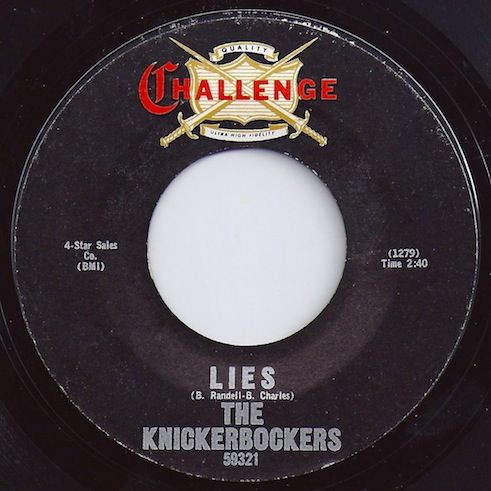
It might never have happened at all though. “Lies,” as recorded at West Hollywood’s famed Sunset Sound studios, with future Doors engineer Bruce Botnick twiddling the knobs, didn’t sound quite right to Fuller, so he took the master recording (which also included the B-side “The Coming Generation”) to the home studio of an up-and-coming jack-of-all-trades named Leon Russell, where the Knickerbockers spiffed up the multi-track with fresh vocals and an overdubbed guitar part. Radio quickly picked up on the final release and, buoyed by the rumor that the song was a new, mystery Beatles single, “Lies” jumped into the Billboard Hot 100 at the tail end of December 1965. By the time it finished its ascent in early ’66, it had reached #20.
Related: What were the #1 songs of 1965?
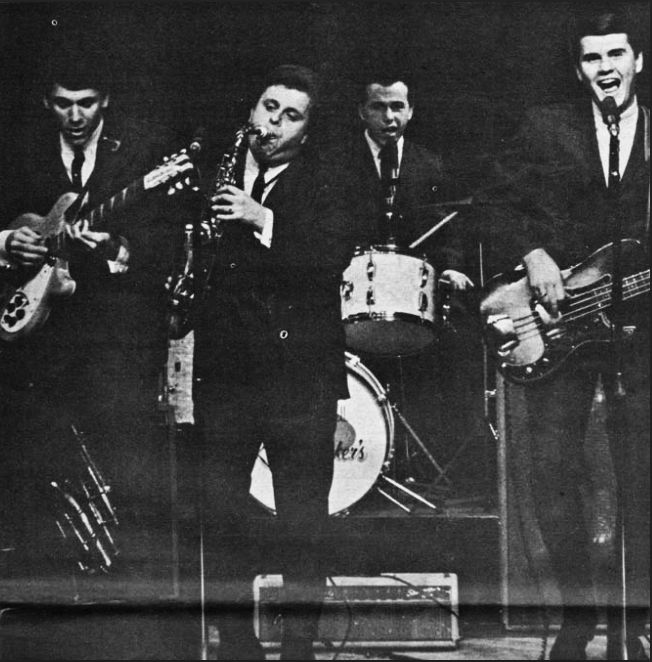
The Knickerbockers performing live on stage in 1965. Left to right: Beau Charles, Buddy Randell, Jimmy Walker, John Charles (Wikipedia photo)
Whether the Knickerbockers qualify as a one-hit wonder or not depends on your understanding of the term. There was a followup, “One Track Mind,” similar in structure to its predecessor, which peaked at #46 in early 1966, and another titled “High on Love” that squeezed its way to #94. The Knickerbockers continued to release singles for Challenge into 1968, and there were a couple of albums, a collection of dance numbers in 1966 called Jerk & Twine Time and the obligatory Lies cash-in later that year, but only the latter charted, topping out at #134. The band members began bowing out in 1968 (Walker actually replaced Bill Medley in the Righteous Brothers for some time), until only the Charles brothers were left. They attempted to keep things going by adding new musicians, but there was no place for the Knickerbockers in the heavier scene of the late ’60s.
There was some room left for the Charleses, however. In 1971, Motown Records, of all things, signed them under the new name of Lodi (named after the New Jersey town, not the one that John Fogerty sang about), and released one self-titled album on its Mowest subsidiary that did nothing. The brothers, along with Randell, went on to back singer Brenda Patterson for a couple of years in the early ’70s, before Beau moved into film work. The brothers never again enjoyed the success they’d had with “Lies” all those years ago.
The song itself did continue to live on though—covers by a diverse array of artists ranging from Nancy Sinatra to Styx to Linda Ronstadt have found their way into the world, and “Lies” continued to enjoy airplay on ’60s playlists as appreciation for the era’s garage-band sound flourished in subsequent decades. Both the hit and “One Track Mind” have appeared on various Nuggets compilation albums, introducing the Knickerbockers to younger generations (and re-introducing them to their original fans).
Watch Peter Case cover “Lies” at a Nuggets celebration concert
Two of the original Knickerbockers, Randell and Walker, have passed away, but as of this writing both Charles brothers—who revived the band twice, in 1983 and ’90—are still with us, telling no lies about the time they came close to the big-time. [Various Knickerbockers collections are available here.]
Bonus Video: Watch the Knickerbockers cover Tom Jones’ hit “It’s Not Unusual”
And then there’s this: If the Beatles really WERE singing “Lies”

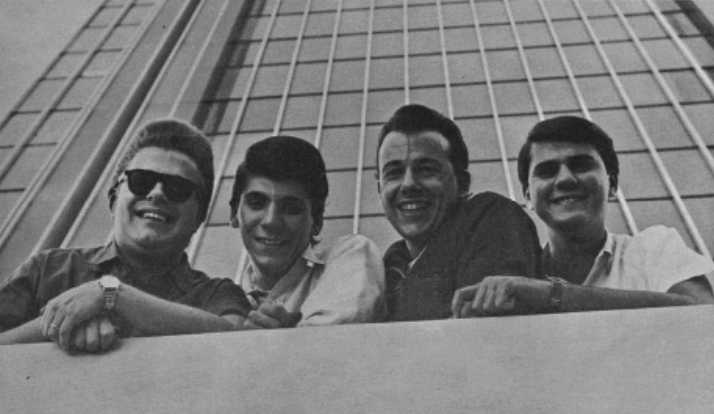

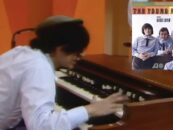
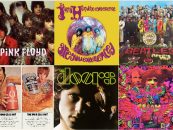
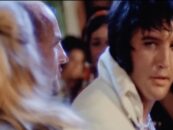
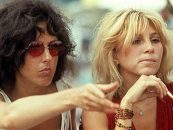

3 Comments so far
Jump into a conversationExcellent upbeat beatlesque song that still sounds refreshing. I got their box set and it was well worth getting.
My only complaint about The Knickerbockers is their name!
I’ve used The Knickerbockers as a one hit wonder several times on a weekend radio show of mine that I’ve had for over 10 years now. Most people qualify a one hit wonder as someone who hit the top 40 only once, though sometimes you HAVE to make exceptions (“Touch of Grey” was the only Grateful Dead song to make the top 40, and I don’t think anyone could legitimately hang that tag on them). That said, I also throw in “One Track Mind” once every year or so, though my oldies show is a bit different, in that it’s billed as “the hits and not so big hits” from the ’60s into the ’80s.
Always loved “Lies” and was one who did think at first it was a new Beatles song. ” If the Beatles sang Lies” was so creative and well done. Loved it!